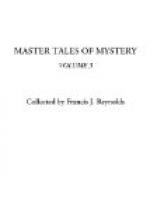“Them cusses must have a dugout nigh abouts, for they couldn’t ‘a’ got away without wings,” the sheriff surmised.
I didn’t put much stock in that idea, and told the sheriff so.
“Waal, round up a better one,” was his retort.
Not being able to do that, I told him of the bullets in the telegraph pole, and took him over to where the mail-car had stood.
“Jerusalem crickets!” was his comment as he measured the aim. “If that’s where they put two of their pills, they must have pumped the other four inter the moon.”
“What other four?” I asked.
“Shots,” he replied sententiously.
“The road agents only fired four times,” I told him.
“Them and your pards must have been pretty nigh together for a minute, then,” he said, pointing to the ground.
I glanced down, and sure enough, there were six empty cartridge-shells. I stood looking blankly at them, hardly able to believe what I saw; for Albert Cullen had said distinctly that the train-robbers had fired only four times, and that the last three Winchester shots I had heard had been fired by himself. Then, without speaking, I walked slowly back, searching along the edge of the road-bed for more shells; but, though I went beyond the point where the last car had stood, not one did I find. Any man who has fired a Winchester knows that it drops its empty shell in loading, and I could therefore draw only one conclusion—namely, that all seven discharges of the Winchesters had occurred up by the mail-car. I had heard of men supposing they had fired their guns through hearing another go off; but with a repeating rifle one has to fire before one can reload. The fact was evident that Albert Cullen either had fired his Winchester up by the mail-car, or else had not fired it at all. In either case he had lied, and Lord Ralles and Captain Ackland had backed him up in it.
CHAPTER V
A TRIP TO THE GRAND CANON
I stood pondering, for no explanation that would fit the facts seemed possible. I should have considered the young fellow’s story only an attempt to gain a little reputation for pluck, if in any way I could have accounted for the appearance and disappearance of the robbers. Yet to suppose—which seemed the only other horn to the dilemma—that the son and guests of the vice-president of the Missouri Western, and one of our own directors, would be concerned in train-robbery was to believe something equally improbable. Indeed, I should have put the whole thing down as a practical joke of Mr. Cullen’s party, if it had not been for the loss of the registered letters.
Even a practical joker would hardly care to go to the length of cutting open government mail-pouches; for Uncle Sam doesn’t approve of such conduct.
Whatever the explanation, I had enough facts to prevent me from wasting more time on that alkali plain. Getting the men and horses back onto the cars, I jumped up on the tailboard and ordered the runner to pull out for Flagstaff. It was a run of seven hours, getting us in a little after eight, and in those hours I had done a lot of thinking which had all come to one result—that Mr. Cullen’s party was concerned in the hold-up.




